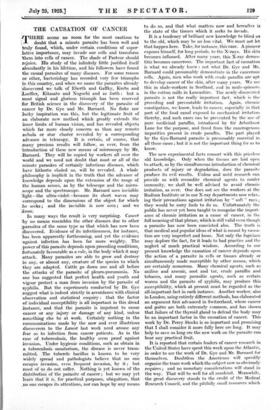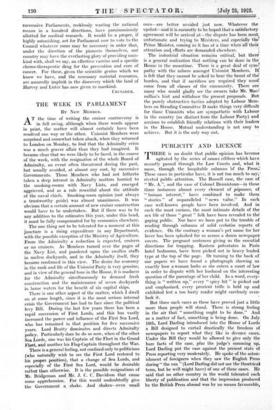THE CAUSATION OF CANCER
THERE seems no room for the most cautious to 1 • doubt that a minute parasite has been well and truly found, which, under certain conditions of super- lative importance, may invade our cells and transform 'them into cells of cancer. The shade of Pasteur should rejoice. His study of the infinitely little justified itself abundantly in his lifetime, and his followers have found the causal parasites of many diseases. For some reason or other, bacteriology has recorded very few triumphs in this country, and when we name the parasites already 'discovered we talk of Eberth and Gaffky, Krebs and loeffler, Kitasato and Noguchi and so forth : but a most signal and glorious triumph has been reserved for British science in the discovery of the parasite of cancer by Dr. Gye and Mr. Barnard. No fluke nor lucky inspiration was this, but the legitimate fruit of an elaborate new method which greatly extends the inner limits of human vision, and has revealed objects which far more closely concern us than any remote nebula or star cluster revealed by a corresponding advance in telescopy. It is certain, of course, that :many precious results will follow, as ever, from the introduction of these new means of microscopy by Mr. Xarnard. They will be copied by workers all over the world and we need not doubt that most or all of the minute parasites of certainly infectious diseases, which have hitherto eluded us, will be revealed. A whole (philosophy is implicit in the truth that the advance of knowledge depends upon the extension of the range of the human senses, as by the telescope and the micro- scope and the spectroscope. Mr. Barnard uses invisible rlight—the ultra-violet—because its short waves may correspond to the dimensions of the object for which .he seeks ; and the invisible is now seen ; and we !know.
In many ways the result is very surprising. Cancer by no means resembles the other diseases due to other parasites of the same type as that which has now been discovered. Evidence of its infectiousness, for instance, has been apparently forthcoming, and yet the evidence against infection has been far more weighty. The :power of this parasite depends upon preceding conditions, fortunately favourable as a rule, in the body which it may attack. Many parasites are able to grow and destroy in any, or almost any, creature of the species to which they are adapted. Cattle go down one and all before the attacks of the parasite of pleuro-pneumonia. No one has suggested that perfect health and youth and vigour protect a man from invasion by the parasite of syphilis. But the experiments conducted by Dr. Gye ,suggest what is indeed strictly in accordance with clinical observation and statistical enquiry : that the factor of individual susceptibility is all important in this dread instance, and that the parasite is impotent to cause ,cancer or any injury or damage of any kind, unless something else be at work. Certainly nothing in the communications made by the now and ever illustrious discoverers to the Lancet last week need arouse any fear as to infection from cancer patients. As in the case of tuberculosis, the healthy seem proof against invasion.. Under hygienic conditions, such as obtain in a tuberculosis sanatorium, the disease is never trans- mitted. The tubercle bacillus is known to be very widely spread and pathologists believe that no one escapes invasion, even frequent invasion, by it ; but most of us do not suffer. Nothing is yet known of 'the distributioh of the pECraSite of cancer ; but we may yet learn that it is; for practical purposes, uhiquitOus, that no one escapes its attentions, nor can hope by any means to do so, and that what matters now and hereafter is the state of the tissues which it seeks to invade.
It is a tendency of brilliant new knowledge to blind us to the old, which may be no less vital. We must not let that happen here. Take, for instance, this case. A pioneer exposes himself, for long periods, to the X-rays. His skin becomes inflamed. After many years, this X-ray dermo- titis becomes cancerous. The important fact of causation is what we already knew : not what Dr. Gye and Mr. Barnard could presumably demonstrate in the cancerous cells. Again, men who work with crude paraffin are apt to develop cancer of the skin, after many years. We see this in shale-workers in Scotland, and in mule-spinners in the cotton mills in Lancashire. The newly-discovered parasite is not the really important fact, which is the preceding and preventable irritation. Again, chronic constipation, we know, leads to cancer, especially in that part of the food canal exposed to mechanical irritation thereby, and such cases can be prevented by the use of pure medicinal paraffin, introduced by Sir Arbuthnot Lane for the purpose, and freed from the cancrogenous impurities present in crude paraffin. The part played by the Gye-Barnard parasite is presumably essential in all these cases ; but it is not the important thing for us to know.
The new experimental facts consort with this priceless old knowledge. Only when the tissues arc laid open to attack, as by the simultaneous introduction of chemical products of injury or degradation, does the parasite produce its evil results. Unless and until research can provide us with recondite chemical agents to confer immunity, we shall be well advised to avoid chronic irritation, as ever. One does not see the workers at the Radium Institute or in our X-ray departments now relax- ing their precautions against irritation by " soft " rays ; they would be sorry fools to do so. Unfortunately the public has never yet been taught to recognise the import- ance of chronic irritation as a cause of cancer, in the full meaning of that phrase, which is still valid even though a parasite has now been convicted also. The truth is that medical and popular ideas of what is meant by causa- tion are very imperfect and loose. Not only the logicians may deplore the fact, for it leads to bad practice and the neglect of much practical wisdom. According to our present knowledge the causation of cancer depends upon the action of a parasite in cells or tissues already or simultaneously made susceptible by other means, which are certainly numerous. Many chemical agents, such as aniline and arsenic, soot and tar, crude paraffin and tobacco, and many parasitic agents, such as certain worms and the parasite of syphilis, may produce this susceptibility, which at present must be regarded as the all-important fact in each instance. Another worker, also in London, using entirely different methods, has elaborated an argument first advanced in Switzerland, where cancer and goitre are both extremely common, and has shown that failure of the thyroid gland to defend the body may be an important factor in the causation of cancer. This work by Dr. Percy Stocks is so important and promising that I shall consider it more fully here ere Tong. It may help to save us long ere the new work on the parasite can bear any practical fruit.
It is reported that certain leaders of cancer research in the United States have spent this week upon the Atlantic, in order to see the work of Dr. Gye and Mr. Barnard for themselves. Doubtless the Americans will speedily organise the team work which the subject now so obviously requires ; and no monetary considerations will stand in the way. That will be well for all mankind. Meanwhile, the great discovery stands to the credit of the Medical Research Council, and the pitifully small resources which successive Parliaments, recklessly wasting the national means in a hundred directions, have parsimoniously allotted for medical research. It would be a proper, if highly astonishing, act for Parliament now to vote to the Council whatever sums may be necessary in order that, under the direction of the pioneers themselves, our country may have the everlasting glory of providing man- kind with, shall we say, an effective vaccine and a specific chemo-therapeutic drug for the prevention and cure of cancer. For these, given the scientific genius which we know we have, and the necessary material resources, are assuredly implicit in the discovery which the land of Harvey and Lister has now given to mankind.
CRUSADER. •



























































 Previous page
Previous page